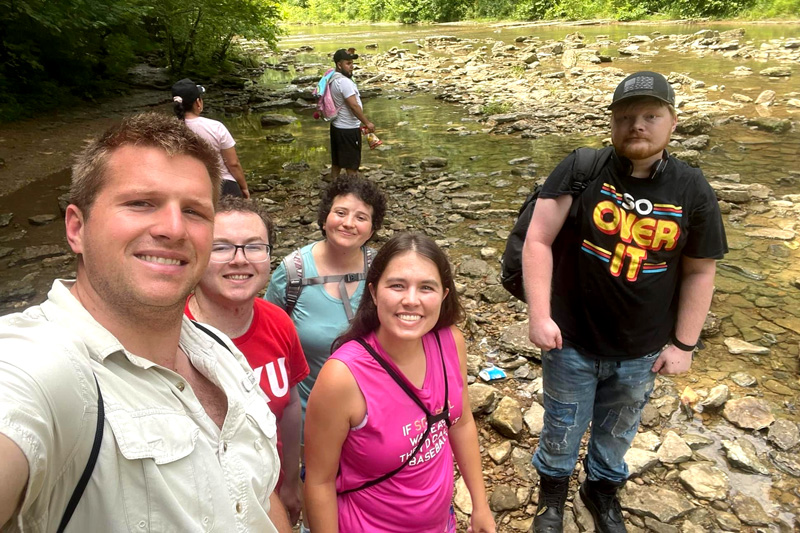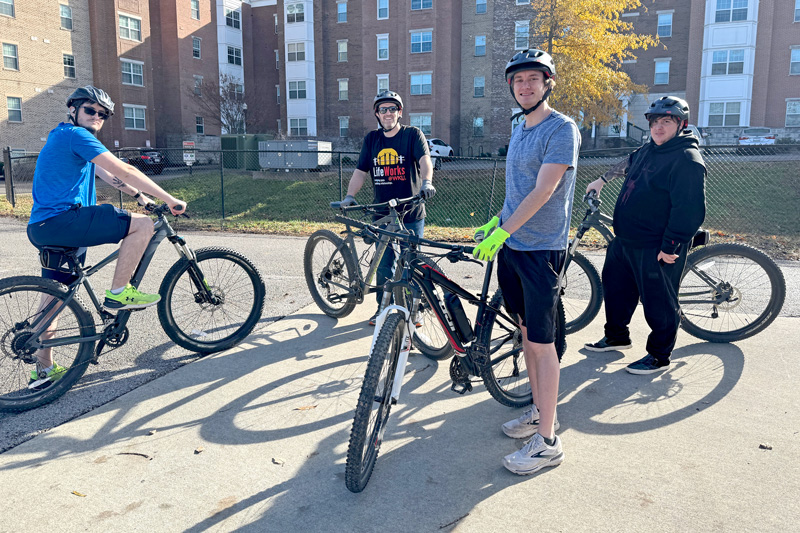Hippocrates said, “Nature itself is the best physician.” In our work with young adults on the autism spectrum to help them develop the skills to live independently, we follow the ancient Greek physician’s advice and ensure that nature plays a crucial role in their growth and well-being.

Author Hendrix Brakefield, left, grabs a selfie with participants at Lifeworks for Autism on a hike, creating unforgettable moments on the trails.
Photo Credit: Lifeworks
Recreation is more than a great way to relax after a long day. Emerging research suggests that recreation, particularly nature-based activities like hiking, camping, or outdoor play, is an important component of wellness, especially for individuals with autism. Rather than merely offering a break, recreation fosters the growth and development of age-appropriate skills that are essential for personal and social well-being.
To me, recreation is any activity that is personally fulfilling and falls outside of our regular day-to-day obligations. It should be refreshing and act as a “cup filler” rather than a “cup drainer.” Recreational activities that involve direct interaction with nature and others and promote physical health, social bonding, and emotional well-being have therapeutic effects on sensory processing and emotional regulation. For individuals on the spectrum, these activities provide environments that can help improve sensory integration. The natural settings offer a calming atmosphere that aids in emotional regulation, reducing stress and anxiety. Studies have shown that spending time in nature can improve mood and overall mental health, making it a valuable tool for individuals with autism (Ulrich, 1984).
I’ve seen the impact that recreation has on the personal growth and social skills of young adults with autism. These activities help build friendships and strengthen interpersonal skills such as communication, trust, and inclusivity. If you’ve ever been camping and tried to pitch a tent, you know the importance of communicating with your fellow campers to ensure that the tent is up and secure. Outdoor recreation fosters a sense of community through group activities and teamwork, providing opportunities to connect, share experiences, and build networks—skills that are essential in everyday life.
We see the most growth when autistic individuals are encouraged and supported to reach outside their comfort zone to try something new. It is human nature, and particularly for those individuals with autism, to stick with the most comfortable thing. However, without ever facing a challenge, we don’t get the opportunity to grow and become the best version of ourselves. The more activities an individual with autism takes on outside their “growth” zone, the more confidence they gain when facing other obstacles. This is where they discover skills they never knew they had, significantly boosting self-esteem. This newfound confidence often extends beyond the hiking or camping trip, positively influencing other areas. This success redirects focus to their capabilities, encouraging them to take on new challenges.
Participating in and getting comfortable with group activities is a key part of preparing for independent living, whether that’s through study groups or group-based work activities. It is equally important to build in social time that is purely for fun with peers. A group day hike at a local park introduces a different dynamic than sitting in a classroom with that same group. Engaging with peer groups recreationally in an outdoor setting offers additional ways of connecting and learning to talk to and trust others.

Adventure awaits on two wheels! LifeWorks participants explore the great outdoors and staying active.
Photo Credit: Lifeworks
There are ways you can incorporate outdoor recreation while integrating fun and responsibility in a way that is fulfilling and manageable. Here’s what we’ve found that works:
Establish a structured routine. Many autistic individuals thrive in an environment with a clear structure. Create a written or visual schedule that outlines the responsibilities, such as work or school, and includes time for recreation. This can help reduce uncertainty and anxiety. Establishing expectations with a regular routine helps make recreation feel like part of the predictable plan.
Incorporate enjoyable activities. Incorporating outdoor activities should not feel like additional tasks but rather an opportunity to unwind and enjoy. Based on personal preference, choose activities that are relaxing or energizing. Fishing, bike riding, hiking, kayaking – all activities that involve interaction with others in nature and boost physical and social health.
Set clear, achievable goals. For those individuals on the autism spectrum, having clear goals helps them focus energy on tasks without feeling distracted or lost. That can be as simple as completing a set distance on a hike or bicycle ride or more complex, such as a total number of hikes or trips completed. A time-limited obligation can also alleviate stress by providing a beginning and end time, allowing individuals to be fully embedded group members without the stress of never-ending expectations. These steps can make it easier to maintain motivation and provide that sense of accomplishment.
Given that so much of the vocational world hinges on strong relationships and networks, outdoor recreation is a great vehicle for fostering connections. Recreation is more than a means of relaxation; it is a key component of wellness that promotes skill development. For autistic individuals, nature-based recreational activities provide therapeutic benefits that enhance sensory processing and emotional regulation. By integrating these activities into our programs, we not only support their vocational growth but also contribute to their overall well-being.
Hendrix Brakefield is the Program Director at Lifeworks for Autism, a living and learning community for autistic young adults as they transition to independent living and employment in Bowling Green, Kentucky.
Citation
Ulrich, R. S. (1984). View through a window may influence recovery from surgery. Science, 224(4647), 420-421.






